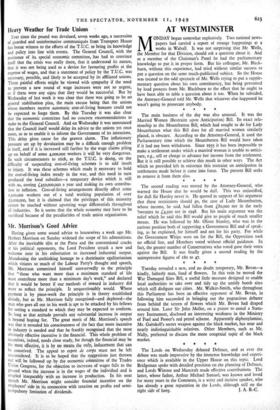Heavy Weather for Trade Unions
Ever since the pound was devalued, seven weeks ago, a succession of guarded and uninformative communiqués from Transport House has borne witness to the efforts of the T.U.C. to bring its knowledge and policy into line with events. The General Council, with the assistance of its special economic committee, has had to convince itself that the crisis was really there, that it understood its nature, that it was not being used as a device for favouring profits at the expense of wages, and that a statement of policy by the T.U.C. was necessary, possible, and likely to be accepted by its affiliated unions. These painful efforts might be viewed with sympathy if the need to prevent a new round of wage increases were not so urgent, or if there were any signs that they would be successful. But by Wednesday of last week it was clear that there was going to be no general stabilisation plan, the main excuse being that the unions whose members receive automatic cost-of-living bonuses could not be expected to forgo them. By this Tuesday it was also clear that the economic committee had no concrete recommendations to make to the General Council. And on Wednesday it was announced that the Council itself would delay its advice to the unions yet once more, so as to enable it to inform the Government of its intentions. This delay gives cause for the gravest alarm. The inflationary pressure set up by devaluation may be a difficult enough problem in itself, and if it is increased still further by the wage claims piling up on behalf of some 4,000,000 workers it will be very dangerous. In such circumstances to stick, as the T.U.C. is doing, on the difficulty of suspending cost-of-living schemes is to add insult to injury. It was these schemes which made it necessary to hold the cost-of-living index steady in the war, and this need in turn produced the food subsidies—a temporary device which is still with us, costing E45o,00o,00o a year and making its own contribu- tion to inflation. Cost-of-living arrangements directly affect some 1,5oo,000 workers out of a total working population of over 23,000,000, but it is claimed that the privileges of this minority cannot be touched without upsetting wage differentials throughout all industries. So it seems that the whole economy may have to be sacrificed because of the peculiarities of trade union organisation.


































 Previous page
Previous page